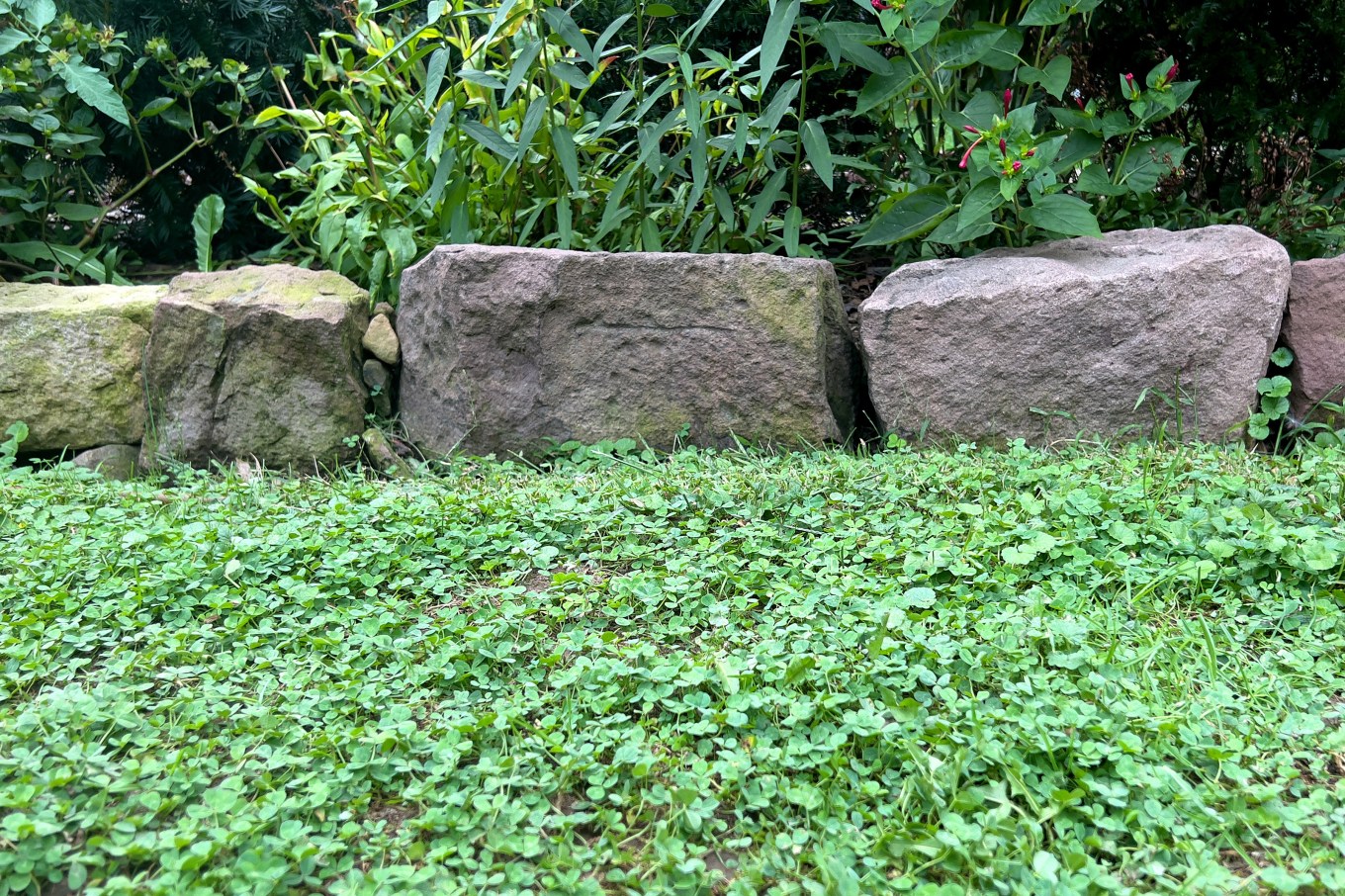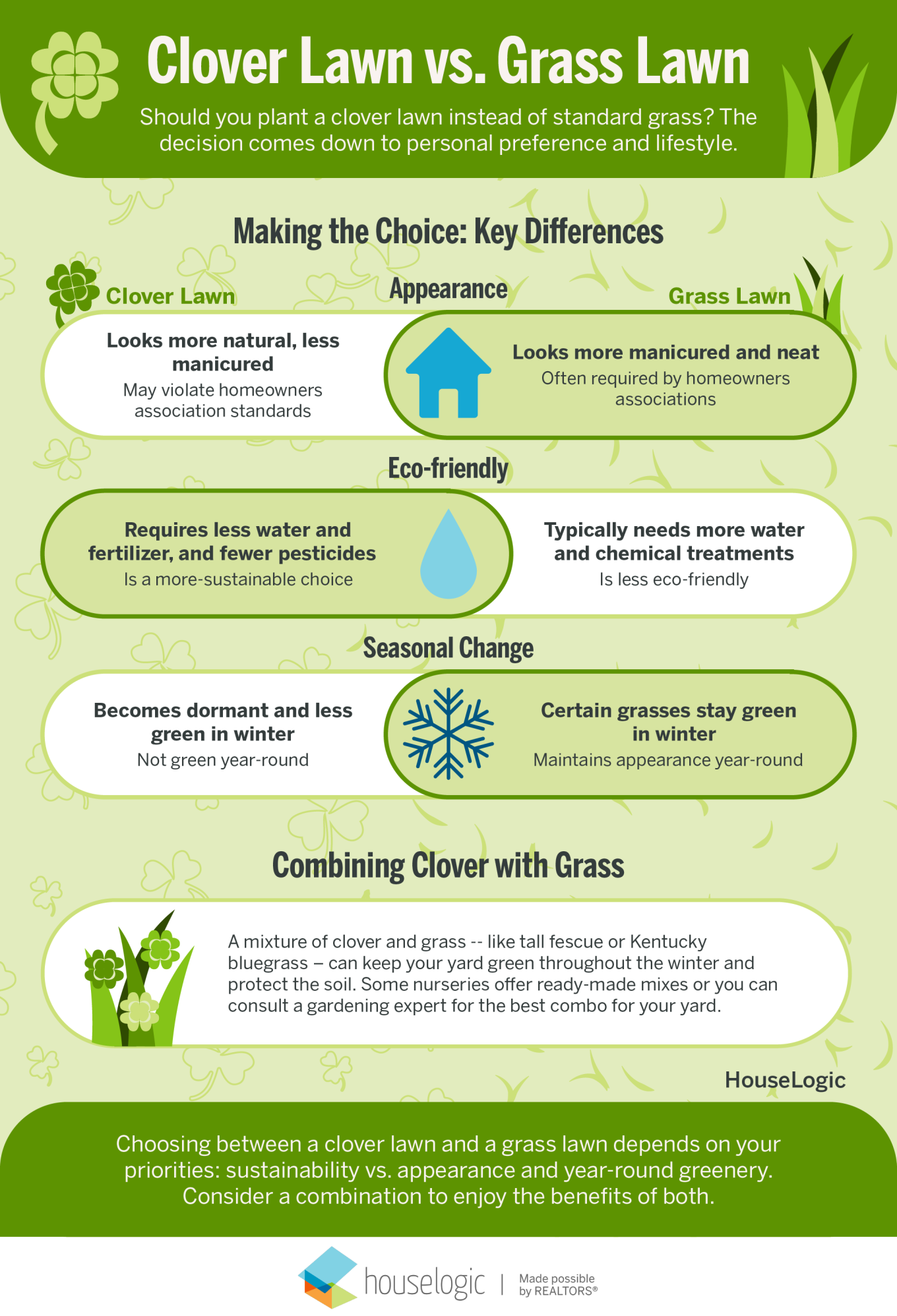It sounds unconventional. Clover was widely considered a weed, after all. But clover lawns have been shaking up the gardening world as a trendy, minimal-care, alternative to grass. Clover is relatively low maintenance, isn’t very thirsty and doesn't need much mowing. These factors alone make it the lawn of choice for many homeowners. Plus, it tends to be a hardy, year-round lawn option for any season. But before you take the plunge into the world of emerald-green clover, dive into what you need to know to make an informed decision.
What is a Clover Lawn?
A clover lawn is a type of landscaping element that uses clover plants as a ground covering alternative to traditional grass lawns. Clover ground covers will flower and attract pollinators to your yard. Here are a few varieties of clover to consider:
White clover: White clover is a tough perennial that provides everything most homeowners are looking for: a lush green blanket for their yard that doesn't need much mowing, weeding, or fertilizing. White clover can grow well in cold, rainy conditions with well-drained soil.
Microclover: Some people opt for microclover, which has smaller leaves and grows more slowly than white clover. Microclover was specially cultivated to create a neater ground cover look than regular clover. You may be able to choose from different varieties depending on seed availability.
Red clover: This perennial herb is slightly taller and bushier than white clover. It won't survive an extremely cold winter, but thrives in a dry or moist climate with well-drained soil. These plants also produce reddish-pink blooms.
Strawberry clover: Strawberry clover has a higher tolerance for salinity than other clover varieties, so it's ideal for coastal homes. It tolerates short periods of drought and can grow well even in waterlogged soil.
Clover Lawns Pros and Cons
While plenty of homeowners are choosing clover rather than grass, clover lawns have their downsides. Before making a specific landscaping choice, it's a good idea to learn the pros and cons of clover lawns.
Clover Lawn Pros
Clover lawns offer myriad benefits that make them an appealing alternative to traditional grass lawns. Here are a few:
- Add nitrogen-fixing properties: As a member of the legume family, clover is a nitrogen-fixing plant. Growing clover instead of grass naturally enriches the soil with nitrogen, reducing the need for chemical fertilizers.
- Need less water: Clover lawns tolerate drought, meaning they require less water to thrive. Clover can be an eco-friendly choice for water-conscious gardeners.
- Attracts pollinators: The charming white clover blossoms attract pollinators like bees and butterflies, adding more touches of nature to your outdoor space. (While this is generally a pro, it should be a safety concern for homeowners with bee or insect allergies, or kids or pets that will play in the yard.)
- Need less mowing: Clover lawns are low maintenance, needing only occasional mowing -- less than a handful of times per year up to about a dozen times per year, depending on the variety.
Clover Lawn Cons

While clover lawns have plenty of perks, they have some drawbacks:
- Fast growing: One of the most common concerns is the potential for clover to spread aggressively and crowd out other plants. You may quickly find clover in places you don't want it, like sidewalks and garden beds. This is less likely with microclover, because it’s slower growing.
- Less tolerant of foot traffic: Clover might be less tolerant of being stepped on and rolled over than traditional grass, which is an important consideration for households with kids or pets that love to play on the lawn.
- Poor shade tolerance: Clover will grow fine in partial shade, but it may not survive heavy shade. So, if you have tall trees shading most or some of your yard, clover ground cover may not be a good choice.
Clover Yard Tips
Love the idea of turning your yard into a gorgeous clover mini-meadow? Here are a few tips to help your clover lawn thrive.
When to Plant Your Clover Lawn
The best time to plant clover is in spring or fall. In the spring, the ground is soft and moist from spring rain. Fall also works because of the cooler conditions, which support clover growth.
How to Start a Clover Lawn
Clover seeds can be cast over existing grass lawns or bare soil and lightly raked into the surface for optimal germination.
Follow these four steps for best results:
- Rake and remove debris so seeds can reach the soil.
- Sprinkle seeds by hand. (For a new lawn, aim for a seeding rate of one-fourth to one-half pound of clover seed per 1,000 square feet.)
- Keep the soil damp in the days following your seeding so the seeds don’t dry out; otherwise they may not germinate.
- Water consistently while the plants are still young and sprouting.
Once your clover groundcover is well-established, you won’t have to water it too often (or pay too much attention to it at all!)
Maintaining a Clover Lawn
Once your clover lawn is established, it requires minimal upkeep to look lush and green.
- Watering: Clover is remarkably resilient and can withstand periods of drought better than traditional grass lawns. However, during particularly dry spells, it's a good idea to give your clover lawn a deep watering to help it thrive.
- Mowing: If you want to cut back your time spent on cutting back an overgrown lawn, clover can be a compelling option. Depending on the variety of clover you grow, you may need to pull out your mower only a few times a year. White and red clover can grow to more than 10 inches tall, so mowing every month or so can keep it looking tidy. Microclover calls for even less mowing — a micro-amount — just two or three times a year!
- Pesticides and herbicides: One of the biggest perks of a clover lawn is its natural resistance to pests and diseases, meaning you can ditch the chemical pesticides in favor of a more eco-friendly approach to lawn care. If you do find weeds on your lawn, it's better to pull them out than to use herbicides, because most herbicides kill clover too.
Clover Lawn vs. Grass Lawn

Should you plant a clover lawn instead of standard grass? Ultimately, the decision comes down to personal preference and lifestyle factors. Here are a few more factors to consider:
- Eco-friendly: Clover lawns require less water, fertilizer, and pesticides than grass, making them a more sustainable choice for environmentally conscious homeowners.
- Neat appearance: Grass lawns may offer a more manicured appearance that many homeowners desire. If you're part of a homeowner's association you may have to uphold rules that require grass lawns instead of alternatives.
- Dormant in winter: Clover will become dormant in winter, so it won't be green throughout the year. A combination of clover and grass may resolve this issue. Let's consider this in a little more detail.
Combining Clover with Grass
A combination of turfgrass and clover is a great way to get the best of both worlds. A mixture of clover and varieties like tall fescue or Kentucky bluegrass can keep your yard looking fresh throughout the winter and prevent soil exposure. Some nurseries sell a ready-made mix of clover and grass seeds. If you can't find a premix, ask a gardening expert at the nursery about the best grass and clover combination for your yard.
Is a Clover Lawn Right for Me?
A clover lawn can be a trendy and eco-friendly, alternative to the usual grass options. Whether you use it alone or mix it with grass, a clover lawn could change your landscaping and your lifestyle, freeing up time or money you would have spent mowing.
